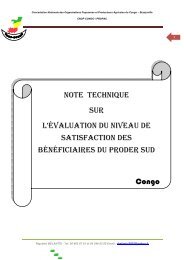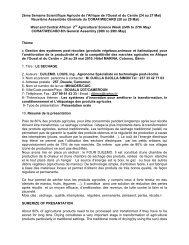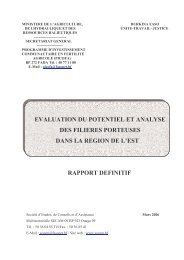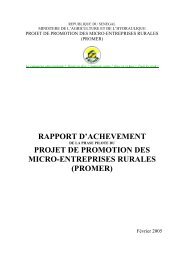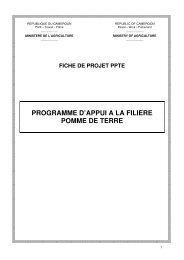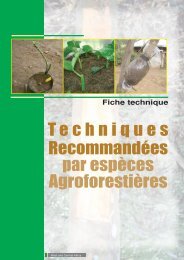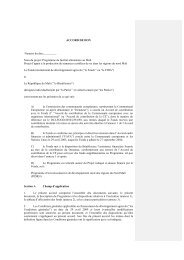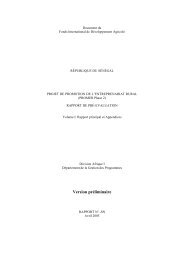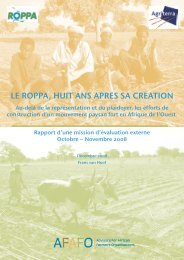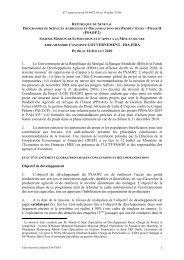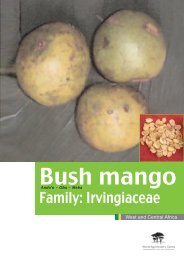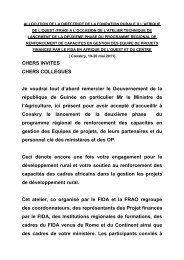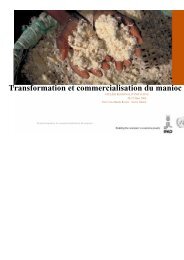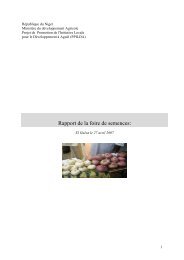Scaling Up the Fight Against Rural Poverty - FIDAfrique
Scaling Up the Fight Against Rural Poverty - FIDAfrique
Scaling Up the Fight Against Rural Poverty - FIDAfrique
You also want an ePaper? Increase the reach of your titles
YUMPU automatically turns print PDFs into web optimized ePapers that Google loves.
of implementation yet and are limited in scale. It is thus premature to assess <strong>the</strong>ir pathway of scaling<br />
up.<br />
b) <strong>Scaling</strong> up pathways – drivers and spaces:<br />
Unmet demand by rural producers and rural enterprises for medium and long-term credit was <strong>the</strong> most<br />
important driver for scaling-up in Moldova. The second driver was continued demand by successive<br />
governments for IFAD to focus on <strong>the</strong>se activities. The engagement of <strong>the</strong> banks, NGOs, government<br />
and IFAD in support of rural producers produced a mutual trust and discipline with high repayment<br />
rates that made <strong>the</strong> approach scalable.<br />
The development of a capable PIU, which strongly supported <strong>the</strong> directed credit operations, created<br />
<strong>the</strong> institutional space for <strong>the</strong> credit operations in Moldova. The good management performance of <strong>the</strong><br />
PIU, headed by an effective leader who believed strongly in <strong>the</strong> utility of <strong>the</strong> rural finance component,<br />
helped mobilize political support for this program.<br />
IFAD’s pragmatism in permitting project implementation de facto to adjust to <strong>the</strong> realities of market<br />
and government demand was a key factor allowing <strong>the</strong> program to scale up into a sustained directed<br />
rural credit operation. Projects were adjusted during implementation as needed: Resources were<br />
reallocated to medium-term and long-term credit where funds disbursed quickly and as components<br />
that did not move were dropped. In that sense, IFAD’s institutional flexibility also provided <strong>the</strong> space<br />
for <strong>the</strong> rural finance program to grow.<br />
c) <strong>Scaling</strong> up pathways – intentions and outcomes:<br />
The Moldova rural finance program has achieved substantial scale in terms of loans extended. But as<br />
mentioned, this was less <strong>the</strong> outcome of a deliberate approach; it was ra<strong>the</strong>r <strong>the</strong> result of a pragmatic<br />
implementation process supported by an effective PIU. Bringing <strong>the</strong> rural finance component to<br />
substantial scale is not a declared objective of IFAD’s country program paper (COSOP). Project<br />
documents convey <strong>the</strong> intention of gradually focusing IFAD interventions away from support for<br />
investment lending, presumably so as to align IFAD operations in Moldova more closely with IFAD<br />
corporate priorities. But implementation practices supported rural finance credit as <strong>the</strong> overriding<br />
priority. The result is a strong role of IFAD as a provider of medium-and long-term credit to rural.<br />
Evaluations of <strong>the</strong> specific projects supported by <strong>the</strong> IFAD directed credit lines have been positive.<br />
Repayment rates are very good, as noted earlier. Direct employment and income effects are favorable.<br />
But poverty impacts have not been estimated. Much of <strong>the</strong> justification of <strong>the</strong> rural finance programs<br />
rests on <strong>the</strong> assumption of important linkage effects in <strong>the</strong> rural economy. To assess <strong>the</strong>se effects, clear<br />
ex-ante baselines and goals would need to be set and progress against <strong>the</strong>se subsequently evaluated.<br />
This is not presently <strong>the</strong> case.<br />
One of <strong>the</strong> important original objectives of IFAD engagement was to jump-start a lending program that<br />
Moldovan banks would subsequently continue with <strong>the</strong>ir own resources. This stage appears not yet to<br />
have been reached as commercial banks continue to be reluctant to extend medium- and long-term<br />
loans to rural enterprises and producers from <strong>the</strong>ir own funds. The absence of medium-and long-term<br />
deposits in banks and a lack of access by banks to international financial markets are among <strong>the</strong><br />
reasons given why Moldovan commercial banks do not extend medium- and long-term investment<br />
funds. There also appear to be systemic impediments in <strong>the</strong> Moldovan banking system that prevent <strong>the</strong><br />
stated objective to be achieved. These obstacles need to be identified and addressed so that commercial<br />
banks <strong>the</strong>mselves take on a stronger engagement in investment lending. As long as IFAD and o<strong>the</strong>r<br />
donor funded credit lines remain <strong>the</strong> principal source of investment funding to rural areas, <strong>the</strong><br />
programs are not sustainable. In this sense <strong>the</strong> sustainability of <strong>the</strong> model without IFAD’s continued<br />
20



